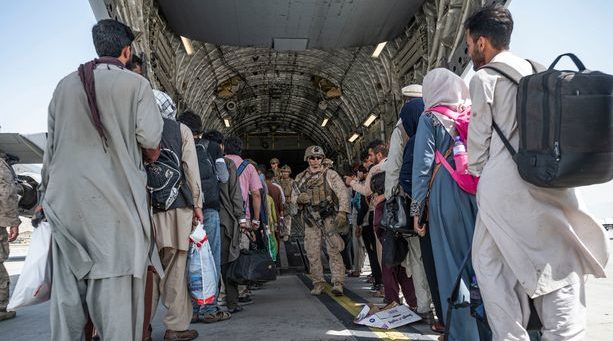How will we integrate Afghan refugees who currently fleeing to the UK from Taliban rule? We all remember the difficulties faced by countries like Germany after the 2015 refugee crisis, including bouts of violent immigrant attacks and local public services put under immense strain. To some, that remains Chancellor Angela Merkel’s biggest failure in office, and the fallout may yet be felt at this weekend’s German elections.
Britain, however, has opted for a much more sensible path — so here are five reasons why I’m optimistic about our resettlement scheme.
For one, newcomers will enrolled in an integration programme, including hundreds of hours of language lessons, civic classes and even culture passes for museums and galleries. A shared language is the glue which holds together a nation — and there is no doubting that relatively low levels of English language proficiency is a barrier to social and economic integration. This played a part in substandard integration outcomes for Britain’s Pakistani- and Bangladeshi-origin minorities (especially female first-generation migrants). We have learned from that.
Secondly, the UK is continuing to be cautious about the numbers of refugees settling the country. The numbers do not even compare to Germany’s million refugees in 2015 — we will initially welcome up to 5,000 of the most vulnerable Afghans to the UK, with a total of up to 20,000 people in the longer-term.
Thirdly, the UK is being more selective about the profile of refugees entering the country. Currently, the UK is looking to prioritise ethno-religious minorities which are most at risk of human rights abuses and dehumanising treatment by the Taliban. This will include sheltering members of the education-oriented Hazara ethnic minority — predominantly made of Shia Muslims who have historically suffered from Sunni Islamist-led persecution in Afghanistan. Of course, given that the majority of British Afghans being Sunni Muslims of Pashtun ancestry, integration between these groups will need to be carefully managed.
Fourthly, the scheme will prioritise those who closely cooperated with British forces during the war (such as interpreters), as well as those who have a track record of championing female empowerment in post-2001 Afghanistan. It follows that a degree of ‘values alignment’ should already help to facilitate social and civic integration.
Finally, unlike many continental countries, Britain has a sound legal-protection structure — especially when compared with the militant colour-blindness contained in France’s rigidly secular universalism or the shortage of robust equality bodies in Germany. It is something which is glossed over by those who peddle rather simplistic ‘intolerant Britain versus tolerant EU’ narratives. Afghan refugees should be made aware of the religious freedoms and anti-discrimination regulations afforded under British democracy — which should foster additionally positive orientations towards their new democratic home.
All things considered, I am optimistic over Britain’s ability to successfully integrate Afghan refugees under the current resettlement plans. The UK Government has noticed what has worked in other European countries and is looking to build on this with a sensible number of refugees that will arrive over a phased period. The combination of a responsible asylum system with a thoughtful integration policy offers the best chance of a more successful immigration experience.
Dr Rakib Ehsan is a research fellow at the Henry Jackson Society.











Join the discussion
Join like minded readers that support our journalism by becoming a paid subscriber
To join the discussion in the comments, become a paid subscriber.
Join like minded readers that support our journalism, read unlimited articles and enjoy other subscriber-only benefits.
Subscribe